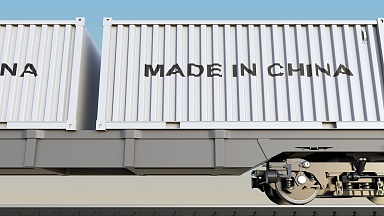During his address to the Federal Assembly of the Russian Federation in late February, Russian President Vladimir Putin expressed Russia’s commitment to establishing efficient logistics corridors in collaboration with its allied nations.
«New countries are actively joining organizations such as the EAEU, SCO, and BRICS. The vision of establishing the Greater Eurasian Partnership holds immense promise, aligning with the integration processes within the Eurasian Economic Union and the People’s Republic of China’s One Belt, One Road initiative. Positive developments in the Russia-ASEAN dialogue and the groundbreaking Russia-Africa summits underscore the momentum towards stronger partnerships. The African continent’s assertiveness in defending its interests and sovereignty is increasingly resonant. We stand in full support of these shared aspirations,» Vladimir Putin said.
Last May, Oleg Belozyorov, General Director and Chairman of the Management Board at Russian Railways, participated in the fourth video conference meeting of the heads of railroads of the SCO member states. In his address, he emphasized the pivotal role of international transportation corridors in enhancing regional connectivity and fostering competitiveness among the SCO economies.
«We aim to establish a sustainable framework for information exchange, which would enable us to share the national infrastructure development plans and best practices to address bottlenecks. This framework has the potential to evolve into a valuable tool for enhancing cross-border connectivity within the SCO railroad network,» the head of Russian Railways said at the video conference meeting.
The SCO was founded in 2001, with the declaration of its establishment signed by the leaders of Kazakhstan, China, Kyrgyzstan, Russia, and Tajikistan. Uzbekistan became a member in the organization’s inaugural year. Subsequently, in 2017, India and Pakistan were granted full membership to the SCO, followed by Iran in 2023.
Currently, the combined length of the railway network across SCO countries stands at 348.3 thousand kilometers, with 210.2 thousand kilometers of electrified lines. The annual cargo volume handled by this network amounts to approximately 8.2 billion tons, with a freight turnover of 7.5 trillion ton-kilometers and a passenger turnover of nearly 1,424 billion passenger-kilometers.
Since its inception, the SCO has consistently prioritized the advancement of the transportation sector, particularly the railway industry. This dedicated focus has positioned railway transport as a pivotal component in bolstering economic relations among member nations, fostering trade growth, and promoting tourism. The interconnected transport network plays a vital role in enhancing economic integration within the region and elevating the competitiveness of the member countries.
Hence, as outlined in the Program of Multilateral Trade and Economic Cooperation of the SCO member states signed on September 23, 2003, member states of the organization pledged significant focus on enhancing the transport and logistics infrastructure, encompassing international freight and passenger railway services.
In November 2019, during the Council of Heads of Government meeting in Uzbekistan, attendees approved a new Program extending until 2035, outlining the organization’s strategic direction for the future.
The document outlines various areas of collaboration in the realm of transport and logistics. These encompass the establishment and enhancement of International Transportation Corridors (ITCs), collaborative efforts in constructing and upgrading railway infrastructure projects, advancements in transport interconnectivity, the initiation of new railway endeavors within the SCO region, ensuring transport safety, and the integration of innovative technologies.
At the conclusion of the Council of Heads of Government meeting of the SCO member states in Bishkek at the end of October last year, an action plan was endorsed to execute the Concept of Interaction of Railway Administrations among SCO member states. Subsequently, merely a week later on November 1, the inaugural SCO International Transport Forum took place in Tashkent.
During the event, participants of the organization deliberated on strategies to establish robust transport and logistics networks, expedite the completion of ongoing infrastructure projects, and explored avenues to bolster economic growth in the transport sector through gradual digitalization.
During his address at the forum, SCO Deputy Secretary General Sohail Khan emphasized the organization’s growing transportation horizons.
In 2023, Belarus adopted a document outlining an expedited process for joining the SCO. In November of the same year, Belarusian President Alexander Lukashenko signed a law ratifying the memorandum outlining the republic’s obligations to attain full membership status in the SCO. Belarus has committed to gradually ratifying internal documents necessary for its accession to the organization, with a deadline set for April 15, 2024. Once all the international documents specified in the memorandum and its annexes come into effect for Belarus, of which some have already been ratified, the SCO Council of Heads of State will deliberate on granting Minsk the status of a full member state within the organization.
It is noteworthy that the majority of SCO states endorsed Belarus’ accession to the organization.
«The successive accession of Iran and Belarus paves the way for enhanced transportation communications development in the SCO region,» he said. «Given that half of the organization’s members are transit countries and some are landlocked, we advocate for pursuing a coordinated transit policy among SCO members, that would include unified cargo monitoring.»
Russian Deputy Transport Minister Dmitry Zverev recommended that SCO partners align their investments in transportation projects and establish a framework to encourage investments in this infrastructure.
Additionally, memorandums were signed on the sidelines of the forum for the establishment of two new ITCs: «Belarus — Russia — Kazakhstan — Uzbekistan — Afghanistan — Pakistan» and «Russia — Caspian Sea — Turkmenistan — Uzbekistan — Kyrgyzstan».




